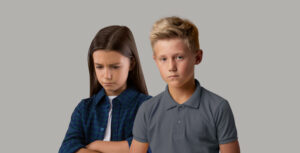If you discover your teen has a tendency toward aggressive behavior, there are steps you can take to help yourself learn more about the pattern and triggers so you then may effectively address the situation with your teenager.
First, start by identifying the pattern. Oftentimes, your teen becomes aggressive as a way of coping when they are stressed out or after they have suffered a disappointment. Writing down your observations about the following will help you to identify specific triggers that increase your child’s aggression.
We recommend you answer each question:
1. What time and date is it?
➢ Before school, after school or on Sunday night.
2. What location does your child become aggressive?
➢ Kitchen, hallway, or their bedroom
3. What type of behavior is shown?
➢ Yelling, cursing, punching walls, or pushing others.
4. Who is the behavior towards?
➢ Mom, Dad, sibling, pets or objects.
5. Who is around when aggression is present?
➢ Immediate family only, their friends, or just Mom.
6. Who isn’t around when the aggression is present?
➢ Dad, other family members, neighbors, or coach.
7. Immediately after the aggressive outburst (within 30 minutes), how did your teen act?
➢ Played video games or watched TV, walked out of the house, or ate a specific type of food.
8. How did you teen act several hours after the aggressive outburst?
➢ Felt guilty, apologized or acted like nothing happened.
Next, it is important to note the triggers. Triggers may be external (things that happen to or are said) or internal (negative or irrational self-talk messages). Regardless of the origins once your teen is triggered the result is often the same, aggression. Here are some common triggers of aggression in older teens:
Common External Triggers:
➢ Bullying from classmates or even teasing from family members especially parents.
➢ Denial of a certain item that is perceived by the parent to be a privilege whereas for the teen it’s not.
➢ A certain type of person, place or thing that reference a traumatic event such seeing an ex-boy/girl friend or an explicit post on social media.
➢ There is a strong link between the use of alcohol and other drugs and aggression.
Common Internal Triggers of aggressive teen behavior include:
• Feelings of overwhelming anxiety, inferiority, shame and frustration due to.
➢ Having a perfectionist personality or high expectation of oneself.
➢ Constantly comparing to peers or media images of how one ‘should be.’
➢ Shame when not able to grasp a subject or topic.
➢ Frustration when something doesn’t turn out the way he/she had expected.
Negative Self Talk drives your teen’s feelings which determine their aggressive actions. Examples of negative self talk or “internal triggers” are:
➢ I’m stupid, ugly, and dumb.
➢ No one will ever love me.
➢ I can’t tell my parents, they will never understand.
➢ No one will ever understand my situation.
Once you’ve identified the issues, you can better devise a strategy for dealing with them. If we can help, please contact Breaking the Cycle Consulting today to schedule a private consultation or visit our programs page to check out other services we offer. And, as always, with Breaking the Cycle, we invite you to #staysafe.









